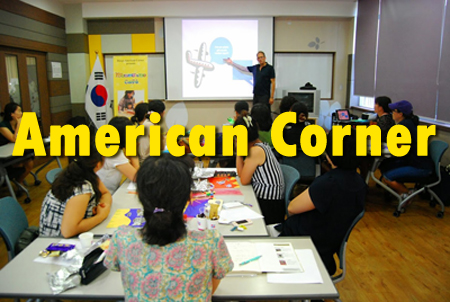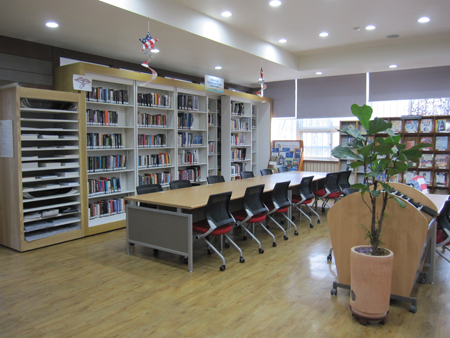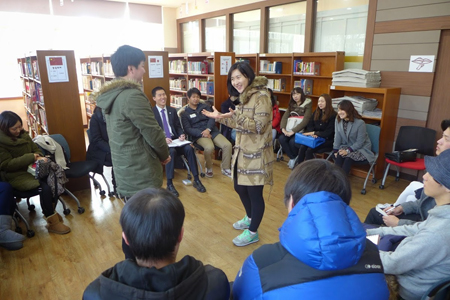
These days, we are accustomed to living with American culture. We eat hamburgers in McDonald’s and drink coffee in Starbucks. Furthermore, we buy clothes or shoes from Nike or New Balance and watch dramas and movies such as CSI or The Avengers. Like these, we are familiar with American culture and experience American culture in indirect ways. However, we don’t know about American culture deeply. There is a place that helps us know about American culture. It is American Corner. In this “Cover Story” the Gazette will introduce American Corner.
American Corner is supported by the American Embassy and three Korean public libraries, and it provides much information about American culture. American corners are located in three big cities: Daegu (Daegu Jungang Library), Busan (Busan Simin Municipal Library), and Gwangju (Gwangju Municipal Library).
The main purpose of American Corner is collecting diverse information about American culture and sharing it with people. Daegu American Corner has about 5,000 books related to America, a newspaper (The Korea Herald), and 11 magazines. Daegu American Corner also has 1,300 DVDs and 50 videos. You can read books like Women in Politics, published by the Department of State, or Outline of the U.S. Legal System, published by the U.S. Embassy in Seoul. You can watch DVDs such as a documentary about the presidents of America. Moreover, Daegu American Corner has a lot of movies for children like The Simpsons Movie and Bambi. Unfortunately, you can’t borrow DVDs. The reason is that it is hard to collect DVDs and periodicals related to the U.S., and the quantity is limited.

The other purpose of American Corner is designing and operating many programs. Daegu American Corner has two kinds of programs: programs operated by American Corner and programs operated by the U.S. Embassy. English Class teaches children basic English expressions with movies in winter vacation, and Story Telling Kids teaches children a lot of English words with picture books. These two programs were operated by Keimyung University students last year. Daegu American Corner has a plan to recruit new volunteers for the next program. Kim Eun-ah, who is a coordinator of Daegu American Corner, said, “In the last program, few students applied to be volunteers. We thought the problem is that many students feel afraid of combining volunteer work and their school life. Therefore, we will consider students’ schedules as much as possible.”
The U.S. Embassy operates Uncle Sam’s Reading Camp and English Lounge. In English Lounge, the leader of the program is usually a diplomat or an aide. For example, the English Lounge on January 21 was led by Borchien Lai, who is an assistant regional program officer in the Embassy of the United States of America in Seoul. The English Lounge on February 13 was led by Eunice Ha, who is an aide in the Public Affairs Section in the U.S. Embassy in Seoul. They lead the programs and gave students feedback on how they can make more useful and correct English expressions.
The three American Corners each have their own Facebook page. On their Facebook pages, they share their programs and event information in real time. For example, on April 10, Daegu American Corner updated information about the “Education USA” presentation on April 17 related to studying law in the United States. The presenter is Sarah Gonzales, who is assistant director of the Straus Institute for Dispute Resolution in Pepperdine University School of Law. Furthermore, they often find volunteers through their Facebook page. On April 9, Daegu American Corner found two volunteers for its Easter program on its Facebook page.
American Corner shares a lot of information and materials related to American culture. Furthermore, it provides good programs about American culture and gives us an opportunity to improve our English speaking and writing ability. The Gazette thinks it will be a good place to improve your English skills and learn about American culture. If you click American Corner Facebook page, you can see all its information in real time.

Interview
The Gazette interviewed Borchien Lai, who is an assistant regional program officer in the Embassy of the United States of America in Seoul.
1. Is there any special reason to choose three big cities (Daegu, Busan, and Gwangju)?
Yes, absolutely. First, there is a little bit of history. Back in the day, we used to have American culture centers in Daegu, Busan, and Gwangju, but they closed. I can’t remember when they closed, but maybe about 1990 because of budget issues. 10 years later, we decided to open the American Corner programs and chose the same cities. The cities were originally chosen because they are really big metropolitan cities and they have really big populations. The U.S. Embassy cannot ignore that. We have continued to say to all the people who are here, Korea is not just Seoul. Korea is also Daegu, Busan, and Gwangju, all of the regions. By being here, we are able to connect with a lot of people who don’t live in Seoul.
2. What is the reason that the American Corner is located in a public library?
The U.S. Embassy chose a public library because libraries share information and they also have ongoing programs. A library is the best place to publicize American Corner’s purpose. At the same time, public libraries already have systems to publicize something. In this regard, public libraries can be the best partner for American Corner. We like to share the ideals that the U.S. and Korea have in common, such as democracy and human rights.
3. What do you think about a supporters program to publicize American Corner?
I think that’s awesome. Our programs are created by people in Daegu. We need a local representation who can tell us that this is what people want, this is what we need, and this is how we can reach out to the schools and universities. I think that is possible for this American Corner. For a group of young people or professors, anyone who wants to be involved, to take an interest in American Corner and tell us that this is what you can do better, this is what we need, and this is a program that we want. I’ll say, “Do it! Go for it!”








